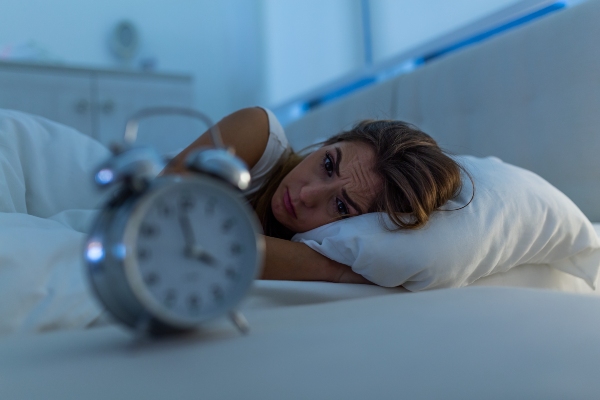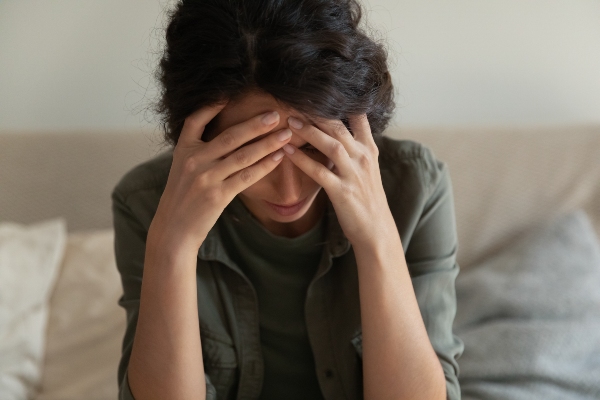 Patients struggling with depression often suffer from sleep difficulties, such as insomnia. Clinical Depression is associated with sleep disturbances (both problems getting asleep and maintaining it) or excessive sleep. As a result, it might be difficult to tell if depression is causing sleeplessness or whether insomnia is causing depression. A visit to the psychiatrist is necessary to diagnose the underlying condition and get treatment.
Patients struggling with depression often suffer from sleep difficulties, such as insomnia. Clinical Depression is associated with sleep disturbances (both problems getting asleep and maintaining it) or excessive sleep. As a result, it might be difficult to tell if depression is causing sleeplessness or whether insomnia is causing depression. A visit to the psychiatrist is necessary to diagnose the underlying condition and get treatment.
Insomnia and Depression: A Tangled Web
Patients feeling low also often complain of a lack of sleep, suggesting a close relationship between the two conditions. About 75 percent of patients with depression also struggle with insomnia. People with depression often have problems falling asleep, wake up frequently during the night, and then have trouble getting back to sleep. As a result, they will wake up the next day feeling exhausted, drained of energy, and maybe even more down than before. Headaches and backaches are some physical symptoms that may arise from untreated depression.
Lack of sleep may have severe consequences on a person's well-being. Sleep problems are often the first indicator that a person needs medical attention for significant depression. In addition, lack of sleep makes it difficult to control one's emotions. Low energy and a lack of interest in things that used to bring joy are common symptoms of depression.
How Depression Symptoms Affect Sleep
Without proper treatment from the psychiatrist, depression may cause patients to feel hopeless and helpless, which can harm their ability to go to sleep. Their minds may wander at night, bringing up thoughts and feelings of despair, hopelessness, and sadness. It is easy for negative emotions to seem insurmountable while tossing and turning in bed. The longer patients dwell on unpleasant feelings, the more difficult it is to fall asleep.
Insomnia’s Repercussions
Getting enough sleep is crucial for maintaining healthy brain function. Inadequate sleep affects one's mood and energy level. Sleep deprivation can also cause daytime sleepiness, idle mind, fatigue, inability to focus, and challenges with decision-making.
Insomnia may be a symptom of clinical depression in some persons. Those with insomnia are up to 10 times more likely to get depressed than those with a good night's rest. Trouble getting asleep and staying asleep are two of the most predictive indicators of depression.
Treatment for insomnia and depression
Depression and chronic insomnia have several symptoms, and relieving one may improve the other. Unfortunately, neither of these disorders is likely to improve without therapy and may exacerbate one another. Medication, psychotherapy, or a combination of the two is often used to treat depression. Insomnia relief is a common side effect of treating depression.
Patients can avoid future episodes of depression by learning coping mechanisms through psychotherapy, also called counseling or talk therapy. In addition, sedating antidepressants or a hypnotic medicine for sleep are standard medication options that may help with both depression and insomnia.
Final note
Various medications may treat depression and insomnia; however, the first option may not always be practical. It might take two weeks or more for antidepressants to take action. Therefore, you may need to test many drugs before discovering the right one.
Avoid ignoring mental health issues like depression or sleeplessness. These conditions may adversely affect a person's psychological and physical health when left untreated. You should book an appointment with the psychiatrist for evaluation and treatment.
Request an appointment or call Future Psych Ketamine Clinics at 843-788-9718 for an appointment in our Myrtle Beach office.
Recent Posts
Electroconvulsive therapy (ECT) involves the application of tiny electric currents to the brain to induce a short seizure. ECT appears to reverse the symptoms of some mental health disorders by altering brain chemistry. Therefore, a psychiatrist will recommend ECT after other therapies have failed, especially when the entire course of treatment is administered.Early therapies of…
No one should have to live with symptoms of depression that hinder their ability to function normally or their overall level of happiness. Fortunately, talk therapy offers an effective treatment solution, particularly as part of a more comprehensive depression treatment plan.There is no cure for depression, but there are effective treatments available. Talk therapy is…
The treatment of depression has been the primary focus of studies comparing medication and therapy. The findings support the use of both medicine and psychotherapy as effective therapies. Depressive episodes may vary from moderate seasonal mood swings to severe impairments that make it difficult to do even the most basic self-care activities, let alone holding…


